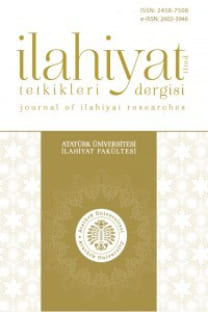TABERÎ TEFSÎRİNDE ABDEST AYETİNİN YORUMU VE TABERÎ’NİN KONUYLA İLGİLİ GÖRÜŞLERİ ÜZERİNE BAZI MÜLÂHAZALAR / Notes on the Commentaries by Tabarî on the Particular of the Qor’an Relating to “Ablution”
ÖZETİslâm Tarihinin en büyük müfessirlerinden biri olan İbn Cerîr et-Taberî, abdest ayetinin yorumunda, kimi müfessirler tarafından yanlış anlaşılmıştır. Bunlardan birçoğu. onun abdest alırken ayakları yıkama ve meshetme konusunda insanları muhayyer bıraktığını, dolayısıyla Şî‘a paralelinde bir görüş beyan ettiğini söylemişler ve onu töhmet altında bulundurmuşlardır. Oysa Taberî, ayakları sadece yıkama veya sadece meshetmenin yeterli olamayacağına, aksine her iki işlemin birden yapılması gerektiğine işaret etmiştir. Yani ayakların tümünü su ile ıslatarak el ile de meshedilmesini lüzumlu görmüştür.Anahtar Kelimeler: Taberî, Ehl-i Sünnet, Sî‘a, Abdest, Ayak, Yıkama, Mesh.ABSTRACTThe elucidations by Tabarî, one of the most eminent commentators of Qor’an in the history of Islam, on “ablution” have been misunderstood or misinterpreted by the following commentators.Some of them asserted Tabarî allegedly left it to the option ofthe Muslims either to wash one’s feet thoroughly or just to wipe them by hand and thus favored the view held by Shite sect. However, Tabarî deemed both practices insufficient for physical cleanliness and advised that both practices be performed together, that is, these parts of the body should be washed with water and wiped by hand at the same time.Key Words: Tabarî, Ehl-i Sunnah, Shite, Ablution, Feet, Washing, Wiping.
Anahtar Kelimeler:
-
- ISSN: 2458-7508
- Yayın Aralığı: 2
- Başlangıç: 1975
- Yayıncı: Atatürk Üniversitesi
